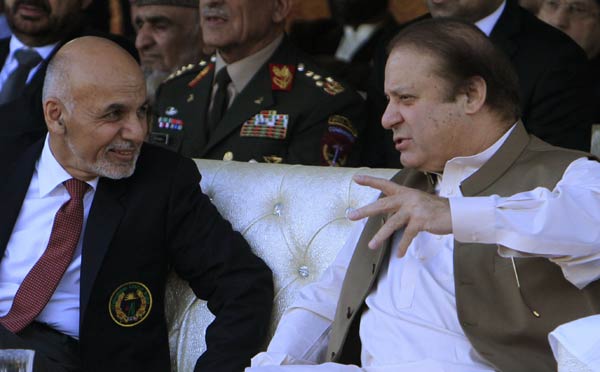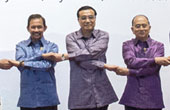President Ghani's visit bridges Pakistan-Afghan trust gap
(Xinhua) Updated: 2014-11-17 14:53
 |
|
Afghan President Ashraf Ghani (L) talks with Pakistani Prime Minister Nawaz Sharif while watching a cricket match between their two countries in Islamabad November 15, 2014. [Photo/Agencies] |
ISLAMABAD -- Afghan President Ashraf Ghani wrapped up his two-day visit to Pakistan at the weekend on a positive note as both countries managed to banish years-long mistrust and build a relationship marked by political, security and economic cooperation.
President Ghani pointed out at his joint press conference with Prime Minister Nawaz Sharif that both countries have "removed the 13 years of differences just in three days."
Pakistan and Afghanistan had long been accusing each other of failing to stop the cross-border movement of the militants who are responsible for attacks on security forces and civilians. Kabul claims Afghan Taliban have hideouts in Pakistan while Islamabad insists the Pakistani Taliban have fled to Afghanistan and now operate from its border regions.
This blame game have badly affected their efforts to jointly fight the insurgents who have claimed the lives of thousands of people, mostly civilians, in both countries.
Ghani's first visit to Pakistan since his inauguration in September provided a unique opportunity for the leaders to focus on bilateral political engagement, trade and economic cooperation, border security and counter-terrorism as well as energy and connectivity.
Prime Minister Sharif reaffirmed Pakistan's support for the intra-Afghan reconciliation process that the new government is initiating. Islamabad's backing of the Afghan-led and Afghan-owned peace with the Taliban is now urgently needed to hold off any instability following the withdrawal of most of the foreign troops just in few weeks.
Concerns about a possible intensified fighting are growing in the post-NATO Afghanistan as the Taliban has refused to stop fighting and hold talks with Ghani's government. Sources privy to the Taliban political office in Qatar say the signing of the controversial security pact with the United States to keep troops beyond 2014 has further complicated the peace process.
The Taliban said the Bilateral Security Agreement means a longer war as the United States and its NATO allies will keep nearly 12,000 troops even after the endgame.
Afghanistan strongly believes that Pakistan has a deep influence on the Taliban and it can play a key role to encourage them to sit face-to-face with Ghani government.
Officials admit that Pakistan had played a role of facilitator in the opening of the Taliban office in Qatar last year to push for the peace process. Pakistan released nearly 50 senior Afghan Taliban leaders over the past two years on the request from former President Hamid Karzai to encourage them to join the peace process.
Related stories:










